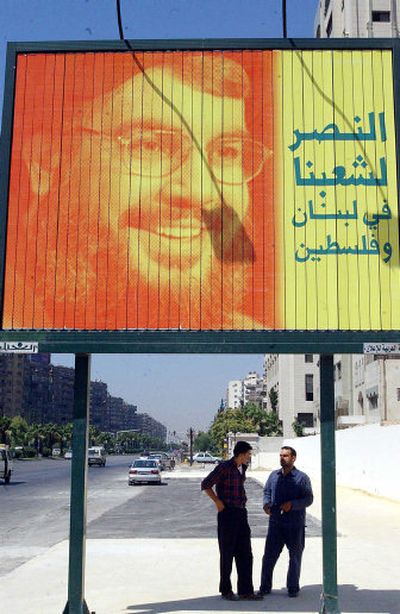Syria to play key role in Lebanon crisis

DAMASCUS, Syria – Long shunned by the Bush administration for its patronage of Hezbollah, its support of terrorism and its hostility to Israel, Syria is suddenly at the center of diplomatic efforts to end the two-week-old war in Lebanon.
U.S. officials want Syria to cut off support for Hezbollah, the Shiite Muslim militant group warring with Israel in southern Lebanon. But the Bush administration has rebuffed Syrian appeals for direct talks, relying instead on its allies Egypt and Saudi Arabia to pressure a regime that the Bush administration has tried to make a pariah.
Syrian officials and regional experts take a dim view of the U.S. approach, in part because the war in Lebanon has brought political benefit for Syria.
Though weakened and isolated, the regime has gained credibility among Arabs for standing up for Hezbollah while U.S.-friendly leaders in the region have criticized it. In Damascus, posters featuring Syrian President Bashar Assad alongside Hezbollah leader Hassan Nasrallah are placed in shops and car windows.
Assad “has built his legitimacy on attaching himself to the Shiite crescent,” said Ayman Abdel Nour, an independent Syrian commentator. “He cannot withdraw from that alliance or he will lose legitimacy in the streets of Syria.”
That alliance includes Iran, a relationship that analysts describe as a “marriage of convenience” against Israel and the United States. Secular Syria’s friendship with fundamentalist Iran also has been a way for Syria to retain standing in the region.
A once-proud country admired in the Arab world for its steadfast opposition to Israel, Syria has seen its influence wane since the assassination last February of Rafik Hariri, a former Lebanese prime minister who threatened to challenge Syria’s grip on Lebanon. High-ranking Syrian officials were implicated in the killing, which led to the end of Syria’s three-decade occupation of Lebanon last year.
The Bush administration recalled its ambassador from Damascus following Hariri’s death. Since then, “Syrian-American relations, for all intents and purposes, don’t exist,” said Mouin Rabbani, a senior Middle East analyst for the International Crisis Group think tank.
The policy of isolation gives Assad little incentive to bow to U.S. demands or to separate Syria from Iran, Rabbani said – especially because it appears that Israel doesn’t plan to expand its offensive to Syria.
Others say Syria has less influence over Hezbollah than is assumed. Although it continues to serve as a conduit for weapons and supplies from Iran, Syria lost whatever direct control it had over Hezbollah when it withdrew its military from Lebanon, many believe.